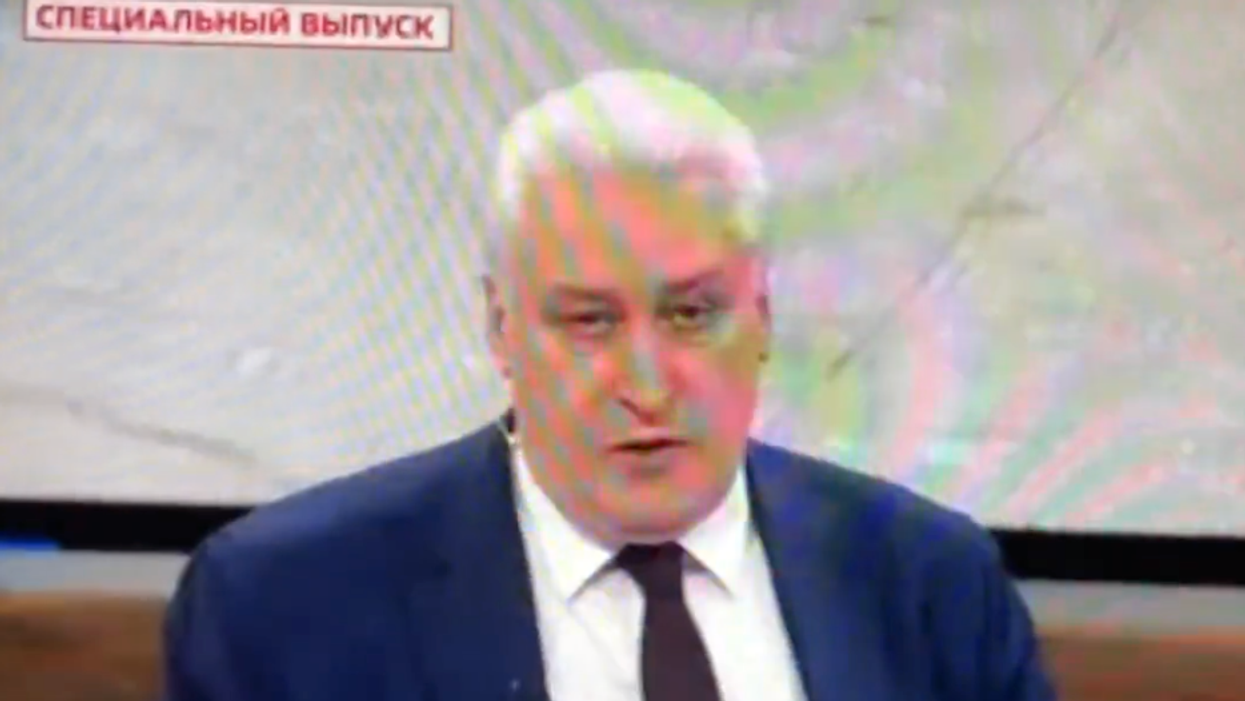Russian state television just threatened the United States with nuclear war again


Russian state television – the Kremlin's propaganda media outlet – reiterated its calls for a nuclear attack on the United States on Tuesday.
Julia Davis, the resident expert Russia analyst at The Daily Beast, shared a clip of "foreign policy expert" Igor Korotchenko proclaiming the severe sanctions that the US has imposed upon Russia for its genocidal war in Ukraine amount to a tacet declaration of war on Russia.
"Meanwhile on Russian state TV: military expert Igor Korotchenko says, in part: 'The West will never lift the sanctions from Russia... This is war. What should be our reaction? Tactical nuclear weapons as battlefield arms... Re-arming Iskanders with special munitions...'"
Watch below:
In February, Russian President Vladimir Putin delivered these ominous remarks in an address:
No matter who tries to stand in our way or all the more so create threats for our country and our people, they must know that Russia will respond immediately, and the consequences will be such as you have never seen in your entire history.
Kremlin spokesman Dmitry Peskov has made similar comments, referring to the crippling sanctions as "economic war" in a speech earlier this month.
"You see the bacchanalia, the hostile bacchanalia, which the West has sown - and that of course makes the situation very difficult and forces us to think seriously," Peskov said on March 9th.
In what can only be interpreted as another provocation, Peskov confirmed in an interview with CNN's Christiane Amanpour on Tuesday that the Kremlin maintains its right to use nuclear weapons if it believes that Russia faces an external "existential threat."
While Russia's initial bluster about using nuclear weapons – namely Putin ordering Russian Defense Minister Sergey Shoygu and the chief of the military's general staff to place the country's massive atomic arsenal on a “special regime of combat duty" on February 27th – was written off with a grain of salt by the West, Russia's operational blunders in Ukraine have begun to box Putin into a corner. Every day, his options for ending the conflict – if he even intends to do so at all – diminish.
More alarming still is that the Russian people largely support these first-strike policies, according to an extensive Active Group survey that was conducted and published last week.
"It also turned out that 3/4 Russians tolerate the use of nuclear weapons by their country under certain conditions. So, to the question 'Do you assume that the Russian Federation, in order to protect its legitimate interests, and provided that Vladimir Putin receives information about the threat of the use of such weapons against Russia, would use nuclear weapons in a restricted way?' 40.3 % replied 'YES' and a further 34.3% expressed doubts about 'may or may not,' which means being willing to support such a decision under certain conditions. And only 25.5% answered 'NO' unequivocally," the Ukrainian-run poll found.
The most concerning aspect of Russia's threats, however, is that its military doctrine explicitly permits the use of nuclear weapons in conjunction with conventional warfare.
"Analysts note that Russian troops have long practiced the transition from conventional to nuclear war, especially as a way to gain the upper hand after battlefield losses. And the military, they add, wielding the world’s largest nuclear arsenal, has explored a variety of escalatory options that Mr. Putin might choose from," William Broad wrote in an expansive analysis of Russia's nuclear deterrence manual in Monday's New York Times.
Broad continued:
'The chances are low but rising,' said Ulrich Kühn, a nuclear expert at the University of Hamburg and the Carnegie Endowment for International Peace. 'The war is not going well for the Russians,' he observed, 'and the pressure from the West is increasing.'
Mr. Putin might fire a weapon at an uninhabited area instead of at troops, Dr. Kühn said. In a 2018 study, he laid out a crisis scenario in which Moscow detonated a bomb over a remote part of the North Sea as a way to signal deadlier strikes to come.
'It feels horrible to talk about these things,' Dr. Kühn said in an interview. 'But we have to consider that this is becoming a possibility.'